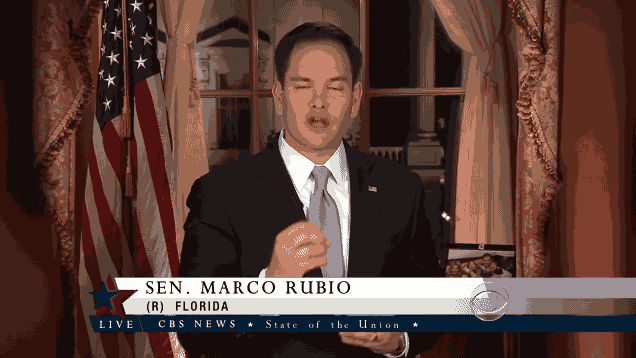Sen. Marco Rubio dropped out of the Republican primary race last night after suffering a big defeat in his home state of Florida.
Rubio spent much of his campaign attacking President Barack Obama, insisting the president was somehow harming America and that he was doing so deliberately. (“Let’s dispel with this fiction …” etc.) He kept at that same theme in his concession speech last night, blaming Trump-supporters’ anger on “eight years of Barack Obama.” That undercut some of the other attempts at lofty rhetoric in his speech, praising the ideals that make America “special,” and pleading for a more hopeful politics.
Ironically, those conciliatory parts of Rubio’s speech sounded very familiar after eight years of Barack Obama. Rubio borrowed heavily from the president’s themes and rhetoric. “Do not give in to the frustration,” he said. “We can disagree about public policy. We can disagree about it vibrantly, passionately. But we are a hopeful people.”
Yep, hope and change, and striving to disagree without being disagreeable, and celebrating an idea of American exceptionalism that isn’t tied to wealth or military might. Rubio should be paying Obama royalties for that whole section of his speech.

But one piece of Rubio’s imitation-Obama rhetoric stuck out when I heard this speech last night on NPR. Without ever naming Donald Trump directly, Rubio condemned the “politics of resentment” fueling Trump’s success within the GOP:
The politics of resentment against other people will not just leave us a fractured party. They’re gonna leave us a fractured nation. They’re gonna leave us as a nation where people literally hate each other, because they have different political opinions.
That last bit, I think, is backwards. It’s not that people have different political opinions and therefore they hate one another. It’s that people “literally hate each other,” and therefore have adopted different political opinions.
That’s what “the politics of resentment” means. It is a politics driven and shaped by resentment, not a resentment driven and shaped by politics. The resentment — the hate — came first. The politics took shape as an expression of that resentment and that literal hate.
















